Mary-Anne Walz: Playing for the Passion of the Game – 2023 Inductee Spotlight
December 3, 2023By Jason Beck
This summer a friend invited me out to Softball City in South Surrey to watch Canada play Italy in a round robin Canada Cup tournament game (Canada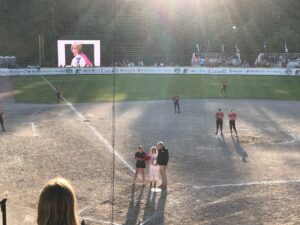 won 7-4 for the record). During a break between innings, I was pleasantly surprised to find Mary-Anne Walz, who played for the Canadian women’s national softball team from 1986-90, was brought down to the infield by organizers for a short ceremony recognizing her 2023 induction into the BC Sports Hall of Fame.
won 7-4 for the record). During a break between innings, I was pleasantly surprised to find Mary-Anne Walz, who played for the Canadian women’s national softball team from 1986-90, was brought down to the infield by organizers for a short ceremony recognizing her 2023 induction into the BC Sports Hall of Fame.
As Team Canada’s current squad stood on the field and in the dugout applauding while a list of Mary-Anne’s accomplishments was recounted over the PA, it was heartening to see Mary-Anne recognized by her peers at home. BC has produced a long line of world-class women’s softball players going back decades before the game became the funded, Olympic sport of recent times and Mary-Anne was one of the strongest links in that chain, one of Canada’s best softball players of the 1980s and an early Canadian groundbreaker of the international game connecting the amateur era to the present.
Born in New Westminster, Mary-Anne grew up on Coquitlam’s Burke Mountain. You could always tell which house was owned by Mary-Anne’s family. All you had to do was look for the basepaths worn into their front lawn. First base was a corner of the house and third base was a tree. Mary-Anne, her three siblings, and her parents all played countless mini-games of softball on that lawn over the years.
“We played the game a lot,” Mary-Anne said in a phone interview with the BC Sports Hall of Fame earlier this year. “It was hopeless for my parents to think they were going to have a nice Pebble Beach kind of surface.”
It may not have been lush, emerald carpet, but it was the perfect training ground for a promising young athlete like Mary-Anne, who played just about every sport available to her, most of which were based at the bottom of Burke Mountain in Port Coquitlam. As a 12-year-old playing on a team with 16-year-olds, she held her own on the first-ever girls soccer team in PoCo just as girls soccer was beginning to start up in the mid-1970s. She played basketball on the Leigh Elementary Grade 7 boys team because there was no girls team. She was a member of the PoCo Pacers track club and remembered receiving an end-of-season award from former Olympic sprinter Irene Piotrowski, a 1993 BC Sports Hall of Fame inductee.
“I was just so thrilled,” recalled Mary-Anne of that moment.
A young teacher at her elementary school, Ed Ponsart, was key to exposing Mary-Anne and her classmates to organized sport for the first time.
“Without him I would never have had any initial path,” she said. “It was pretty exciting. He started a track club. He started the first girls soccer team in town, the PoCo Wranglers. Then he was part of officiating the women’s soccer program in Port Coquitlam.”
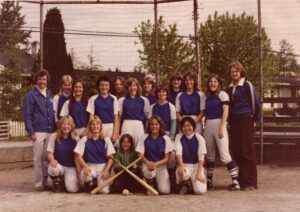 She also played softball in the PoCo Minor Softball Association from age seven onwards. Considering what was to come for her in the sport, it’s a little ironic that softball wasn’t Mary-Anne’s favourite sport growing up, although it was one of the few that only girls participated in and was probably the most organized for girls then.
She also played softball in the PoCo Minor Softball Association from age seven onwards. Considering what was to come for her in the sport, it’s a little ironic that softball wasn’t Mary-Anne’s favourite sport growing up, although it was one of the few that only girls participated in and was probably the most organized for girls then.
“Basketball was probably my first true love, while softball was just something you did,” she laughed. “But then it got better in Poco Minor Softball and I’m still friends with some of the girls I played softball with then.”
When Mary-Anne attended George Pearkes Junior High, another key influence was her basketball coach, Gesele Lajoie. Later Mary-Anne played on the senior women’s basketball team at PoCo High School (now Terry Fox Secondary) when she was just 13. She was always a great athlete in whatever sport she tried from a young age even if she didn’t always realize it herself.
“It’s funny when you look back, when you get that gift you don’t realize what a gift it is,” she said. “And that it’s easy for you and you don’t realize how hard it is for some others. But that’s why I played everything. Because I just could.”
Mary-Anne played on rep softball teams until high school graduation and then decided to take a break “because it was getting boring.” She planned to work for a bit, go on a backpacking vacation through Australia and New Zealand, and then go to university. By that point she had attended some ID camps for the Canadian junior national basketball team and been selected to some invitation-only camps.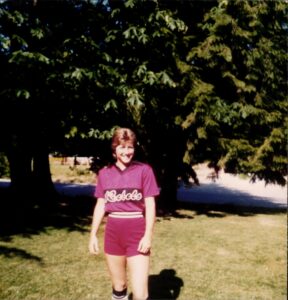
“In my brain I was going to go to SFU to play basketball. That was what I wanted to do.”
If that had occurred, Mary-Anne was such an impressive athlete maybe we would still be writing this article but it would be going off in a much different direction describing her basketball career. What actually happened is this. She returned from her trip and was playing for the Westminster Credit Union Junior A softball team based at Moody Park. In 1981, the Newton Rebels out of Surrey picked her up to play in the Canadian junior national tournament held in Milverton, Ontario. The Rebels finished on the podium and Mary-Anne was named to the tournament all-star team at shortstop. But the key moment happened when Mary-Anne and her friend Tammy Cyr were approached by a scout who was looking for top players who might be interested in playing on an athletic scholarship at US universities.
“I didn’t even know you could get scholarships to play softball,” said Mary-Anne. “We were just twenty years old and like, why not?! That sounds like fun. What’s the worst thing that can happen, right?”
The first stop on the try-out tour was Oklahoma State University.
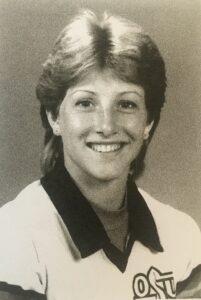 “It was pretty impressive to go down there. We flew down, got put up in a hotel. Coming to the practice, they had our gear and just running through practice with them. Their season had already started. I was like, ‘This is amazing!’”
“It was pretty impressive to go down there. We flew down, got put up in a hotel. Coming to the practice, they had our gear and just running through practice with them. Their season had already started. I was like, ‘This is amazing!’”
Mary-Anne really didn’t know anything about the OSU softball program or the level of play in women’s softball at US universities at that time. She just went down there, did her thing on the field and at the plate, and when she returned home she was offered a full-ride scholarship to OSU. Her friend Tammy was offered a scholarship to Louisiana Tech and went on to break a bunch of school records and later became the winningest softball coach in NCAA Division II history at the University of Western Florida.
“It all came out of going to a tournament in Ontario and us saying yes to the opportunity,” Mary-Anne marveled.
Mary-Anne ended up playing at OSU for four years from 1982-86. It was a huge adjustment at first for her. She had tons of raw talent, but quickly learned she had to work to get to the level played by the top players down there.
“It was tough. I walked into a program—and I didn’t even know this—that was ranked number three in the country. It was one of the top softball schools in the country. I didn’t even know that.”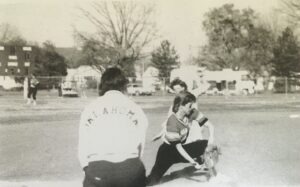
She put the work in even if she often didn’t often see the field, especially that first year.
“So it was hard for me because I was able to participate at that level, but here was this Canadian kid coming in as a freshman and the competition is furious. They’d invested money into their older players, so you had to wait for your opportunities and try to make the best of them.
“When a sport comes easy to you, you really have to be strong psychologically and really want to learn to stick it out. Because it’s hard being far away from home. We didn’t have internet. I could call my parents once a week on Sundays. Didn’t have a ton of money at all.”
But opportunities began to come to her and by her junior year, she was playing all the time.
“That is definitely where I became better technically and just knowing the game, understanding the game. I learned to love that part of the game as well, the psychology of the game.”
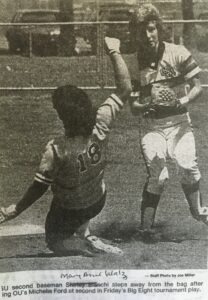 As Mary-Anne became an everyday starter at OSU in her junior and senior seasons, she began to be recognized more in tournaments with awards.
As Mary-Anne became an everyday starter at OSU in her junior and senior seasons, she began to be recognized more in tournaments with awards.
“It was really interesting for me. For a couple years you’re not playing and then you start to play. It was the next level. You just keep working hard. I think it made me a much more empathetic and supportive teammate. I knew what it felt like to be on the bench and all you really want to do was be out there and contribute.”
What also helped was stepping up to a higher level of play back at home too. In BC at that time, the Doc’s Blues playing out of New Westminster’s Moody Park were unquestionably a dynasty. In a nine-year period, the Doc’s Blues under legendary manager Adrian Lavigne won eight BC titles. They also won three Canadian titles in four years. With outstanding players like Rosemary Fuller and Joanne Mick, the 1978 squad, inducted into the BC Sports Hall of Fame in 2014, was perhaps their best winning three different league titles at home and the silver medal at the world championships in El Salvador, to this day Canada’s best-ever world championship result. If you played softball in BC—heck anywhere in Canada—at that time, you knew of the Doc’s Blues. Mary-Anne was no different.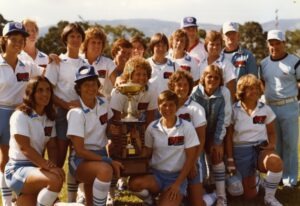
“They were the queens of softball. I very much knew about them. But it never really entered my mind that I would ever play for them.”
After Mary-Anne’s first year at OSU, in the spring of 1982 she came back to BC to play summer ball with the Newton Rebels Junior A team. One day Adrian Lavigne called her up to play with Alpha Sports (the renamed Doc’s Blues) in a tournament. From that point on until 1990, for the bulk of her playing career Mary-Anne played for the best team in Canada.
“I played with legends of the game there. I was so grateful to have gotten to play with those women.”
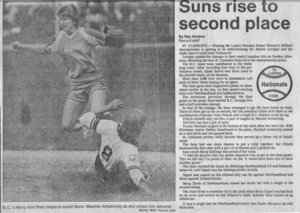 During Mary-Anne’s time with Alpha Sports they won six provincial championships and five Canadian titles while Lavigne had the team travelling to tournaments all over the world playing the sport’s top teams. They’d play in summer tournaments in the US against teams of top college players. Mary-Anne regularly won tournament all-star awards against them but could barely get on the field when she went back to OSU. It was a weird time in her career as she dominated on the diamond in the summer and then in the fall barely played.
During Mary-Anne’s time with Alpha Sports they won six provincial championships and five Canadian titles while Lavigne had the team travelling to tournaments all over the world playing the sport’s top teams. They’d play in summer tournaments in the US against teams of top college players. Mary-Anne regularly won tournament all-star awards against them but could barely get on the field when she went back to OSU. It was a weird time in her career as she dominated on the diamond in the summer and then in the fall barely played.
“So I’d have all this success, going all over the world, being an all-star shortstop at all these tournaments all over the world and then I go back to school and I’d just keep working hard and working hard and earn more and more playing time.”
It meant between university and the summer season, she was playing ball all year round at that time and for someone as athletically gifted as Mary-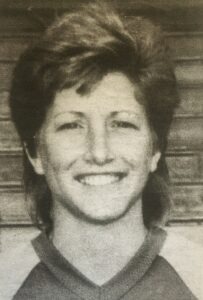 Anne, she couldn’t help but improve her game by leaps and bounds. When she began stepping into the OSU starting line-up, the tournament all-star awards began to follow. In 1985, she finished in the top-three in the Big 8 Conference in stolen bases and runs batted in, while also finishing in the top-ten in batting average. With Alpha, she was named an all-star at shortstop at the 1985 Houston Classic Invitational, as well as the 1985, 1986, and 1987 World Challenge Cup tournaments while also being named top batter in the 1987 tournament.
Anne, she couldn’t help but improve her game by leaps and bounds. When she began stepping into the OSU starting line-up, the tournament all-star awards began to follow. In 1985, she finished in the top-three in the Big 8 Conference in stolen bases and runs batted in, while also finishing in the top-ten in batting average. With Alpha, she was named an all-star at shortstop at the 1985 Houston Classic Invitational, as well as the 1985, 1986, and 1987 World Challenge Cup tournaments while also being named top batter in the 1987 tournament.
Even her summer jobs revolved around softball. When Mary-Anne came home from OSU for the summer, Lavigne hired her to work for his automotive company in New Westminster driving around and picking up parts. Later she worked for the Alpha sportswear company in Vancouver.
Through the 1980s, there likely wasn’t a more complete player on a softball diamond in Canada. Mary-Anne was best known for her stellar fielding at shortstop.
“She once made a catch I’ll never forget,” opposing player Joanne Ward told the Tri City News in 1986. “She was going one way and the ball was hit the other. She turned, dove flat out, and grabbed it. Unbelievable catch.”
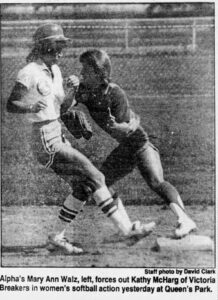 But Mary-Anne was also a strong batter, usually first or second in the batting order on her teams. She also had a strong arm and had good speed on the basepaths.
But Mary-Anne was also a strong batter, usually first or second in the batting order on her teams. She also had a strong arm and had good speed on the basepaths.
“I loved fielding,” she said. “I loved being out there. The sport is two games in one really. You’re out there challenging, just daring any player to hit a ball your way and when you’re up to bat, it’s you and the pitcher. So, I liked both of them. I had plenty of confidence at the plate. I was considered a hard out.”
Mary-Anne was also mentally tough and very disciplined as well as a leader on her teams. They’d be playing all over the world in tournaments in exotic places like Taiwan or New Zealand, but rather than going out and touring the local area sightseeing, she would be back in her hotel room icing injuries and preparing for the next game.
“It was as professional a mindset as it is today.”
In her final year at OSU, Mary-Anne was called up to the Canadian women’s national team program just prior to the 1986 International Softball Federation Women’s World Championship in Auckland, New Zealand. Mary-Anne wasn’t expecting much but an injury to Canada’s regular shortstop, Janis Cookson, gave Mary-Anne a golden opportunity. And that was all she needed. Mary-Anne ended up starting every game at the world tournament and was selected to the All-World Team at shortstop, helping Canada to a solid fourth-place finish.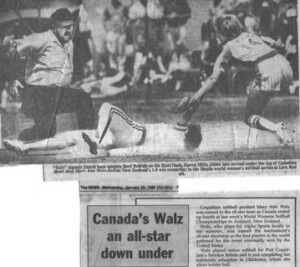
“It was horrible because it was just so close to a medal,” she remembered. “That was tough.”
She would remain Canada’s starting shortstop for the next four years.
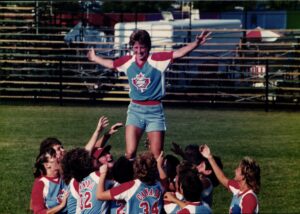 One year later at the 1987 Pan American Games in Indianapolis, Mary-Anne helped Canada step onto the podium with a bronze medal in women’s softball behind the USA and Puerto Rico. An international medal, yes, but it still felt like a disappointing result.
One year later at the 1987 Pan American Games in Indianapolis, Mary-Anne helped Canada step onto the podium with a bronze medal in women’s softball behind the USA and Puerto Rico. An international medal, yes, but it still felt like a disappointing result.
“Again that was tough. We should have finished better. Those things remain in your mind. They don’t go away.”
At the 1990 ISF Women’s World Championship in Normal, Illinois, Mary-Anne helped Canada to sixth place overall. As badly as she wanted to win a world championship medal for her country, it wasn’t to be and remains likely her biggest disappointment.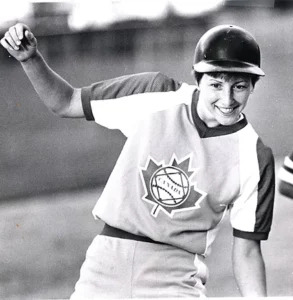
“Because for me that was all we had. That was the pinnacle of success, getting a world championship. And coming so close…yeah, that’s still disappointing.”
The 1990 worlds ended up being the last tournament where Mary-Anne represented Canada internationally.
“After that I took a step back,” she said. “I was a little disillusioned.”
By that point there had been plenty of talk about the International Olympic Committee adding women’s softball to the Olympic program as far back as the 1970s. It looked like it might happen for the 1984 Olympics in Los Angeles but fell through. The same thing happened for the 1988 Olympics in Seoul, South Korea. Softball was actually added as a demonstration sport for the 1992 Olympics in Barcelona, Spain, but then two years out the IOC stepped in and reversed this decision. Understandably there was a lot of frustration in the softball community worldwide over the perennial cold shoulder the IOC seemed to be determined to administer to their sport.
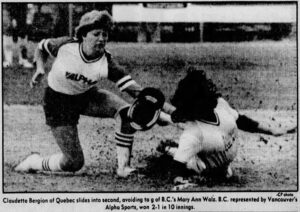 “We were hopeful that we were going to have the Olympics but that didn’t happen,” explained Mary-Anne. “Because everything changes when you’re in the Olympics. There was really a lot of discussion. People were really expecting we were going to get into the Olympics and then it didn’t happen. So I just thought you know what, I think I want to step away from softball now.”
“We were hopeful that we were going to have the Olympics but that didn’t happen,” explained Mary-Anne. “Because everything changes when you’re in the Olympics. There was really a lot of discussion. People were really expecting we were going to get into the Olympics and then it didn’t happen. So I just thought you know what, I think I want to step away from softball now.”
Mary-Anne was invited to the national team camp in 1991, but she declined the invitation.
Instead, she focused on club play and joined the powerhouse White Rock Renegades in 1990. In the final three seasons of her playing career she won three more BC provincial championships (giving her nine total for her career), while winning another Canadian championship in 1992, her sixth career national title, and finishing as the runner-up at the 1991 national championship. After that, she chose to fully retire from play.
“I played for the passion of it and when you stop playing for the passion of it, because that’s what happened, it gets to be a grind. I stopped having fun. When you talk to kids and parents today, it’s all about getting a scholarship. We didn’t have that to aspire to. We just wanted to be the best that we could be. So I don’t think that’s the same reward. But it’s a lot of pressure and I had no pressure. My parents were so supportive. They took me to wherever I needed to be and they were always behind us. Always.”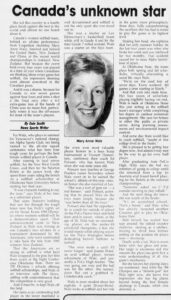
After retiring, Mary-Anne then coached the White Rock Renegades intermediate women’s team for two years (1993-94), guiding a team of young 18-22-year-old players to a provincial title and a silver medal at the Western Canadian Championships in 1993.
“It was a ragtag team, but watching them come together…oh, that’s the best,” she said the pride still evident in her voice. “You really learn to respect coaching when you have to do it yourself. It was fun, it was exciting, yet it was hard for me because I hadn’t been away from the game at all. So I was quite engaged, couldn’t just sit back and be observant. I was probably a little more animated than I would be today.”
After those two years coaching, Mary-Anne stepped away from the game except for helping out at camps once in a while.
“I really haven’t done much with softball for a really long time,” she admitted. “You know, having your summers off, I just never had that experience or that time. But I still get asked. It will browse around in my brain for a little bit—should I give them a call? Especially because I’ve been retired you think maybe that time is not for me anymore.”
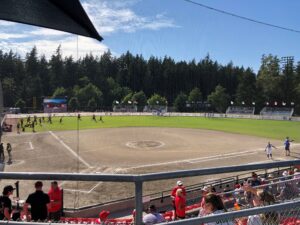 Even though Mary-Anne hasn’t been as active in the sport, she has followed softball’s development here in Canada and abroad over the past thirty years. One of the biggest moments was seeing softball as a full medal sport at the 1996 Olympics in Atlanta.
Even though Mary-Anne hasn’t been as active in the sport, she has followed softball’s development here in Canada and abroad over the past thirty years. One of the biggest moments was seeing softball as a full medal sport at the 1996 Olympics in Atlanta.
“Oh my god! It was so exciting! It felt a little bittersweet too, right? Because you wish that the Olympics could have been one of those experiences that you had, but the world tournaments that we participated in, they were BIG events. And there were lots of people coming to watch us. So that was our Olympics. Would it have been nice to say that you were an Olympian? Absolutely. But that didn’t work out. People that came before us didn’t even get to play at worlds. You’re just laying the foundation for the next generation.”
For a time after it was announced softball would be in the 1996 Olympics, Mary-Anne considered coming out of retirement for a chance to play.
“I did. I actually did. I did a lot of back and forth and thinking about what was driving me to do it and I think it was merely to say that I was in the
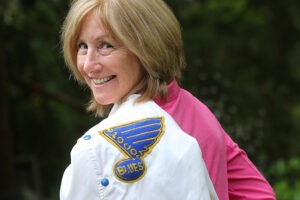
Olympics. But you have to make the team first and I just thought I’m going to leave my career where it was. There was no guarantee I was even going to make the team. It would have been something for sure.”
In the years since, seeing softball moved in and out of the Olympic schedule of events has been difficult.
“You watch sports like softball get pulled out, then pulled back in, out and in, out and in, it’s frustrating. National programs don’t get the funding. When that happened more and more Canadian kids were going down to play at US schools, and playing full schedules. Summer ball became not as important. You weren’t playing 70-game schedules. We played an insane amount of games with Adrian at Alpha. So I think with all those college opportunities for kids, the Canadian senior program in the summer is not in the spotlight and it’s all geared around professional ball on the East Coast.”
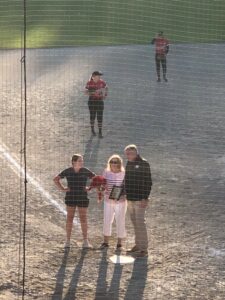 Like many Canadians though, Mary-Anne was glued to her television in 2021 watching Canada’s women earn a gutsy bronze medal in softball at the Covid-delayed Tokyo 2020 Olympics. Like many British Columbians, she took extra pleasure in seeing so many BC women on that team like Danielle Lawrie, Jenn Salling, and Lauren Bay-Regula.
Like many Canadians though, Mary-Anne was glued to her television in 2021 watching Canada’s women earn a gutsy bronze medal in softball at the Covid-delayed Tokyo 2020 Olympics. Like many British Columbians, she took extra pleasure in seeing so many BC women on that team like Danielle Lawrie, Jenn Salling, and Lauren Bay-Regula.
“Oh my god. I’m telling you, that was pretty amazing. I’m very, very proud of every one of them and what they’ve accomplished. It’s just great to watch them.”
It was groundbreaking players like Mary-Anne and others from Alpha Sports and the Doc’s Blues before them that paved the way for that bronze medal and which the current national team continues to build on. That’s why it was so gratifying to see Mary-Anne recognized at this year’s Canada Cup in front of the current Canada squad.
“I worked really hard to be the best that I could be,” she summed up. “I worked really, really hard. I was one of those teammates that was annoying to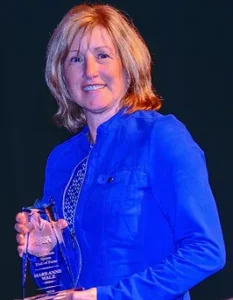 other people. I wasn’t one of those people that would cut corners—no, you can’t. In my mind it was ‘never give them a reason not to play you.’ And that was always sort of my mantra, especially in university. Because that was a hard thing, getting the respect of those girls and coaches. But I was having so much success outside of that arena as far as acknowledging my ability. It was a really hard thing for me to make that starting line-up. I can tell you, I know of people, they just quit. I didn’t quit. It’s hard. Many, many talented people go down to play in the United States and they don’t last.”
other people. I wasn’t one of those people that would cut corners—no, you can’t. In my mind it was ‘never give them a reason not to play you.’ And that was always sort of my mantra, especially in university. Because that was a hard thing, getting the respect of those girls and coaches. But I was having so much success outside of that arena as far as acknowledging my ability. It was a really hard thing for me to make that starting line-up. I can tell you, I know of people, they just quit. I didn’t quit. It’s hard. Many, many talented people go down to play in the United States and they don’t last.”
Mary-Anne certainly did and it translated into a career that has been recognized with induction into multiple halls of fame now: the Softball BC Hall of Fame and the Port Coquitlam Sports Hall of Fame in 2019 with her BC Sports Hall of Fame induction completing the hat trick. Coming from a team sport, Mary-Anne isn’t the most comfortable being singled out for recognition.
“I was considered at the time one of the best in my sport at my position, but it’s still hard for me sometimes to wrap my head around being honoured when I have all these teammates that without them, I couldn’t have achieved anything. That’s what I struggle with a little bit.”
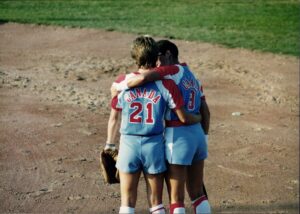 But when it’s suggested to her that the induction of an individual athlete from a team sport often serves as a way to represent and recognize the teams they played on or even their sport in an era, she agrees with that perspective.
But when it’s suggested to her that the induction of an individual athlete from a team sport often serves as a way to represent and recognize the teams they played on or even their sport in an era, she agrees with that perspective.
“That’s a better way to frame it, I think. Because that era definitely laid the foundation for what we see now in Canadian softball and the success that everybody’s having.”
Outside of softball, Mary-Anne worked for Canada Customs as an inspector for 10 years and then for Canada Revenue Agency for 21 years before retiring in 2022.
To this day she has kept deep friendships with many teammates she played ball with in university at OSU and of course for Canada, but also opponents, such as those from the New Zealand and the US national teams.
“It’s a journey that you all took together and we only know that feeling. That’s an experience that nobody else can experience. So that’s fun. One of the biggest surprises in my career is how big that part of my life is to me. You can work for thirty years in another field and for me never have that same feeling.”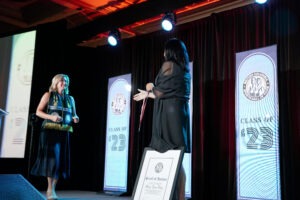
Sports are pretty special in that way, allowing those types of strong bonds to form and last. And for Mary-Anne none were stronger than those forged with her Doc’s Blues and Alpha teammates. She still holds those teams in especially high esteem.
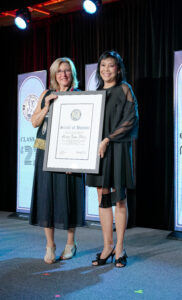 “When I played with those Doc’s Blues and Alpha players, I remember standing there and looking at them thinking, ‘What am I doing here?!’ I held them in such reverence. I just feel so, so lucky that I had the chance to play with them. And I know it’s funny I talk about the national program and that’s a highlight, but that team, those people, yeah, that was pretty special. A few years ago I was looking through some scrapbooks with [legendary Doc’s Blues catcher] Joanne Mick and she kept saying, ‘Yep, yep. You did pretty good girl!’”
“When I played with those Doc’s Blues and Alpha players, I remember standing there and looking at them thinking, ‘What am I doing here?!’ I held them in such reverence. I just feel so, so lucky that I had the chance to play with them. And I know it’s funny I talk about the national program and that’s a highlight, but that team, those people, yeah, that was pretty special. A few years ago I was looking through some scrapbooks with [legendary Doc’s Blues catcher] Joanne Mick and she kept saying, ‘Yep, yep. You did pretty good girl!’”
We can all agree for someone who once thought she’d pursue basketball over softball, Mary-Anne did do pretty good in the latter sport, good enough to earn induction into the BC Sports Hall of Fame as just the second female softball inductee (after Doc’s Blues teammate Rosemary Fuller) and just the third softball athlete overall.
“I find it surreal to be quite honest. It’s such an honour. But it really wouldn’t have happened without my coaches, my teammates, and my parents. I’m very, very privileged.”
As part of the Class of 2023, Mary-Anne Walz was formally inducted into the BC Sports Hall of Fame in the Athlete category at the annual Induction Gala held June 1, 2023 at the Fairmont Hotel Vancouver.